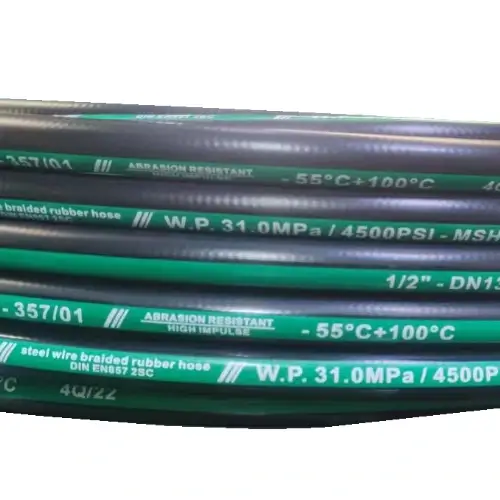335345435
Dez . 10, 2024 12:02 Back to list
soft flexible rubber tubing
The Versatility of Soft Flexible Rubber Tubing
In various industrial, commercial, and medical applications, soft flexible rubber tubing plays a critical role due to its remarkable properties and adaptability. From delivering fluids to providing protection against abrasion, these tubes are an indispensable component in numerous fields. This article explores the features, applications, and advantages of soft flexible rubber tubing.
What is Soft Flexible Rubber Tubing?
Soft flexible rubber tubing is a type of conduit made from elastic polymers known for their ability to bend and stretch without breaking. The most commonly used materials for producing rubber tubing include natural rubber, silicone, neoprene, and various synthetic rubbers. The softness and flexibility of these materials allow the tubing to easily navigate complex pathways while retaining its structural integrity under different operating conditions.
Key Features
1. Elasticity One of the most significant characteristics of rubber tubing is its elasticity. This feature allows it to accommodate varying pressures and flow rates without the risk of rupture. This is particularly crucial in medical applications, where consistent fluid delivery is vital.
2. Chemical Resistance Many types of rubber tubing are resistant to certain chemicals, oils, and solvents. This quality makes them suitable for various industrial applications, such as fuel lines in automotive systems and chemical processing.
3. Temperature Tolerance Rubber tubing can be engineered to withstand a range of temperatures, making it ideal for applications that involve hot or cold fluids. Silicone rubber, for instance, can endure extreme temperatures while maintaining its flexibility.
4. Customization Soft flexible rubber tubing can be manufactured in various diameters, lengths, and wall thicknesses, catering to specific application requirements. Customizable options also include color and additional reinforcement for increased durability.
Applications
Soft flexible rubber tubing has a wide range of applications across different sectors
1. Medical Uses In the healthcare industry, rubber tubing is often utilized in intravenous (IV) lines, catheter systems, and respiratory support equipment. The flexibility of the tubing ensures comfort for patients while also making it easy for healthcare professionals to manipulate and position the tubes effectively.
soft flexible rubber tubing

2. Industrial Applications In manufacturing and processing plants, rubber tubing is used for transferring a variety of materials, including liquids, gases, and granules. Its chemical resistance allows for the safe transportation of corrosive substances, while its flexibility aids in routing tubing through complex machinery setups.
3. Automotive Sector In vehicles, rubber tubing is crucial for fuel delivery, coolant systems, and pneumatic lines. The flexibility ensures that the tubing can fit into tight spaces while absorbing vibrations, contributing to the overall longevity of the vehicle’s components.
4. Home and Garden Soft rubber tubing is also commonly used in gardening applications. Garden hoses made from rubber offer flexibility and resistance to kinking, making watering plants easier and more efficient. Additionally, rubber tubing is used in various home appliances, providing connections that can withstand frequent use and movement.
Advantages
Using soft flexible rubber tubing comes with several advantages
1. Durability Rubber tubing can withstand repetitive bending and flexing, making it a long-lasting solution for many applications. This durability minimizes the need for frequent replacements, saving both time and money.
2. Ease of Use The lightweight and flexible nature of rubber tubing makes it easy to handle and install. This reduces labor costs and enhances productivity, particularly in industrial settings where speed is essential.
3. Reduced Noise Rubber tubing can also dampen vibrations, which helps to reduce noise levels in machinery and automotive applications. This characteristic is not only beneficial for user comfort but also for maintaining a quieter work environment.
4. Safety Features Many types of rubber tubing are non-toxic, making them safe for applications in food and beverage processing as well as medical use. The soft nature of the material also minimizes the risk of injury in environments where hoses or tubing are frequently handled.
Conclusion
Soft flexible rubber tubing is a versatile and essential component in many sectors, including healthcare, industry, automotive, and home applications. With its unique properties, including elasticity, chemical resistance, and temperature tolerance, rubber tubing can meet a vast range of needs while providing durability and ease of use. As technology advances, the development of new rubber formulations and manufacturing techniques promises to enhance the performance and functionality of these valuable conduits, ensuring they remain an integral part of daily operations across various fields.
-
SAE 100 R17 Black Smooth Cover Hydraulic Hose
NewsMar.07,2025
-
SAE 100 R17 Black Smooth Cover Hydraulic Hose
NewsMar.07,2025
-
SAE 100 R17 Black Smooth Cover Hydraulic Hose
NewsMar.07,2025
-
SAE 100 R17 Black Smooth Cover Hydraulic Hose
NewsMar.07,2025
-
SAE 100 R17 Black Smooth Cover Hydraulic Hose
NewsMar.07,2025
-
steel wire braided hydraulic hose
NewsMar.07,2025



